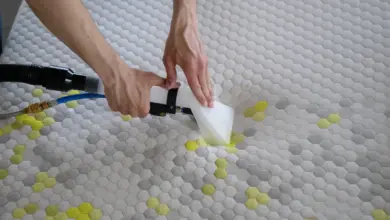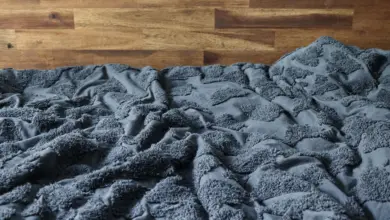What Is The Best Way To Wash Your Sheets?
Do you know what is the best way to wash your sheets? Weekly? Monthly? Do you wash it fortnightly or are you a dirty wizard who washes your clothes every Christmas?
If your mother’s advice to wash your bed linens once a week has sent you into a deep existential crisis. We’ve got you covered.
You can understand why you wouldn’t want your bed sheets to be washed every two weeks. Plus, you’ll save water if you wash them less often.
Who doesn’t like the feel of a freshly washed bedsheet that is soft, wrinkle-free and smells fresh? You would love to have fresh sheets on your bed every night but nobody has time to do the laundry every day. How often do you wash them?

How Often Should You Wash Your Sheets?
You can wash your sheets every two weeks if you do not sleep in the bed every day. If you sleep with pets or sweat a lot, wash your sheets more frequently than once a week. The recommended wash cycle is the same for a flat sheet or a fit sheet.
You can decide whether you should wash your sheets more often than once per week by considering the following factors.
-
Showering before bed:
Showering every night will make your bed sheets cleaner than those who do not. Bathing gets rid of sweat, dirt, and dead skin that may have been deposited on your bed.
-
Wearing Pajamas to Bed:
Some people prefer to wear cozy pyjamas at night. If you’re the type who swears by PJs, your dead skin cells will be trapped in them and not end up on your sheets.
-
Your pets:
We love our pets, but it’s hard to bathe them every day. If you share your bed with pets, you should wash your sheets more often than other people.
-
Turning and Tossing
You will shed more skin cells if you toss and turn a lot while you sleep. However, if you are a “dead-to-the-world-sleeper”, then you are less likely to shed cells.
-
Drooler
You should be regularly cleaning your bed sheets if you find drool stains on your pillowcase.
-
Skin Issues
You may be transferring bacteria to your sheets if you suffer from skin conditions such as eczema or acne. It is therefore in your best interests to change your bed sheets frequently.
How often should you change your sheets?
It is a good idea to wash your sheets and change them weekly. It is good to keep three sets of sheets per bed. This way, you always have one set on the bed and two in the laundry.
Our internal survey of 1000 Australian participants shows that the majority of people don’t change their sheets as often as they need to:
- The average Australian changes their sheets once every 12 days or five days per week. It is recommended that sheets be changed every week.
- According to a survey, women change their sheets every nine days, while men do so every fifteen days.
- The Australian couples surveyed were the most clean, with 84% changing their sheets every eight days.
- Only 25% of Australians report that they change their bed sheets every week.

Why only wash your sheets once a month?
Unhygienic bedding can make you susceptible to illness, in addition to ensuring you don’t sleep in filth or risk allergies.
-
Sweat and pollen:
Sleeping in filth is not a pleasant experience. The average body loses 500 million skin cells and sweats up to 100 litres a day. Pollen, dirt and dust that are deposited every day create a toxic environment for sleeping.
-
Skin Infections:
Unclean sheets can accumulate bacteria and cause a microbiome imbalance. If you have sensitive or acne-prone skin, changes to your microbiome may trigger eczema and lead to acne.
-
Dust Mites:
Dust mites are the most common pathogen found on unwashed bed sheets. These are common bed bugs that feed off sweat, skin cells, and seminal liquid. Dust mites thrive in moist sheets, which are created when we sweat. Dust mites are a serious health risk for asthmatics.
-
Bed Bugs:
Bed bugs can be found in dirty sheets. They suck blood from you and leave you with itching and rashes. Bed bugs can be detected by regularly washing your sheets and airing out your mattress.
The Verdict
It is recommended that you wash your sheets once a week. You’re right, you need to wash your bed sheets every week to keep them clean. Otherwise, you could end up with pimples if you sleep on dirty bedding for weeks.
In the winter, however, you may want to extend it up to 10 days. As we sweat more in the summer, our sheets tend to become dirtier faster than at other times of year. It is therefore recommended that you wash your bedsheets weekly. This will also keep your sheets clean and free of dust, pollen and other allergens that can accumulate on your bed in the summer and trigger your allergies.
We know that doing laundry is not something anyone looks forward to. So we can understand the frustration of having several sheets each week to wash and dry. This is why you should always have several sets of sheets in your closet. You can then change your bedding every week without waiting for it to dry and be cleaned.
Washing sheets at 60 degrees Celsius is recommended, as this kills bacteria and dirt. The sheets can be dried in the sunlight to ensure that the microorganisms have been killed.

The Best Ways to Wash Bed Sheets
Washing your bed sheets weekly is not enough. It is also important to wash your bed sheets in a hot cycle, at least 60 degrees C.
This ultimate guide will help you keep your sheets clean and free of allergens.
- To ensure that your sheets stay clean, rotate them every two weeks.
- Use a mild detergent such as eucalyptus, or another organic one, if you have sheets.
- The detergent must be completely dissolved before you can wash the sheet in a top-loading washing machine. A detergent that is not diluted can stain your sheets.
- Use only natural fabric bleaches or brighteners. Bleach and other fabric brighteners can damage the fibres of your bed sheets.
- Linen bed sheets can be gently machine-washed at 40 degrees Celsius.
- Make sure you don’t overfill your washing machine. Make sure there is enough space for the water to pass through.
- To avoid chemical buildup on the fibres of your sheets, complete a full wash cycle.
- The dryer should have enough space to allow air to circulate, allowing the sheets to dry. Do not tumble dry in the machine.
- Before storing your linen in the cupboard, make sure it is completely dried. You can let your linen air-dry for a few minutes after you have used your dryer.
- Keep your pillow protectors clean to ensure a restful night of sleep.
Maintaining Clean Bedding During Washes
You can keep your sheets fresh between washes by following these tips.
-
No Binge
Avoid eating or drinking in bed. You will still end up spilling some chips or bread crumbs on your bed, no matter how careful or attentive you are. It is therefore best to keep binge-eating sessions away from your bed.
-
Remove makeup before bed
You can stain your pillowcases and sheets with lipstick, mascara, or blush if you sleep wearing make-up. Washing your face is the best way to avoid such stains, and to maintain healthy skin.
-
No slippers or shoes on the bed
This simple rule will help you keep your sheets cleaner for longer. Never wear slippers to bed, even if they are comfortable and you don’t think that they are dirty. Or if you feel too tired to take off your shoes. Your slippers and shoes will be exposed to germs, dirt and dust on the carpet and floor of your home. They should not be worn in bed.
Conclusion
When you get into bed at the end of a hard day’s work, it’s only natural to not think about bedsheets. You may enjoy the feel and smell of clean, fresh bedsheets. They might even help you sleep better. However, the luxury of hotel room service is not available at home.
You sweat on your bed sheets, you drool and you do *you-know-what* on them. It is only a matter of basic protocol to wash them frequently, given how much time you spend with them.
It’s not as difficult as it seems, with the affordable and sustainable laundry services available today. You can make Sunday your laundry day. This is a simple organisational habit that will reap rewards in the form of fresh, clean linens and a good night’s sleep.




